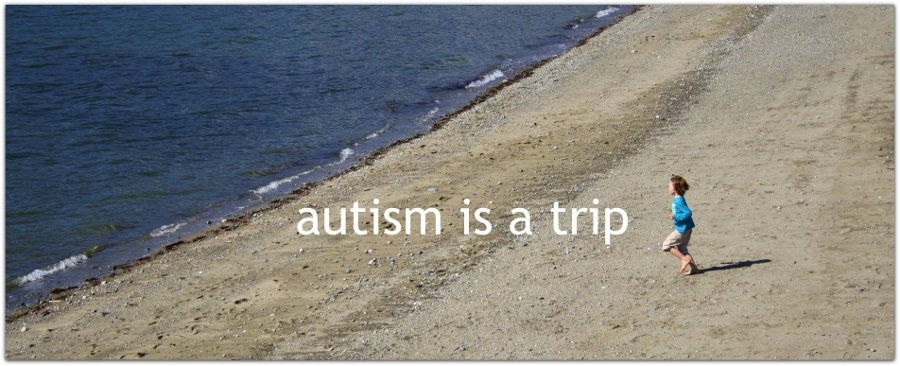Among family and those I consider close friends (people I have real, off-the-computer relationships with), more than thirty of their children are either on the autism spectrum, suspected of being on it, or have associated behaviours (ADHD, etc). In the last month alone, two dear friends have had a child diagnosed with autism.
Autism is everywhere, and that’s all right. Learning a child actually has autism, however, can be quite a shock.
We suspected Jack had at least a sensory processing disorder, and were actually hoping for an official autism diagnosis. With a diagnosis comes support and interventions.
When the psychiatrist at his evaluation actually suggested autism, though, it was an ice cold smack in the face.
Sometimes, even when you know your child is autistic, it hurts to hear it out loud.
Hearing the words, seeing the actual reports and assessments in your hands… somehow changes the game. You’re no longer on the sidelines, rather, you’re suddenly center field with the ball in your hands. Game on.
So now what?
As the saying goes, there is no rest for the weary. Parents of a newly diagnosed child are suddenly inundated with action plans, financial concerns, and their own, often conflicted, emotions.
And people who want to help. Lots and lots of well-intentioned people.
Parents of autistics are often overwhelmed with good intentions that are not always constructive. Some actually hurt. I doubt most of these folks even realize what they’re doing.
So, I came up with a few suggestions.
Things you should not say or do to a parent with a newly diagnosed child:
1) Express sorrow and/or pity.
The child has not died, and has not been diagnosed with a terminal illness. Autism is a life-long condition, but it’s not a death sentence. Please don’t act as if it is. Sympathy is good, pity is not.
2) Immediately suggest a diet/test/protocol.
Every person with autism is different, and not all respond in the same manner to the same things. The family will likely explore all of their options to find out what will work best for their child.
3) Start forwarding them every single article/email/meme/book that mentions the word autism.
They have just entered this world, and need some time to adjust. Drowning them in autism stories only complicates the situation.
4) Ask what they think caused the child’s autism.
To date, nobody knows what causes autism. There are a multitude of theories, but no concrete evidence, anywhere. Some studies point to genetics, some point to environmental influences, but none have a conclusive answer. Parents do nothing to “cause” their child’s autism, and asking this question passively-aggressively implies they did.
5) Share horror stories.
This is similar to scaring a first-time mom with horrible birth stories. Yes, autistic children wander, are abused in schools, and are open to any number of other terrible things. Just as you shouldn’t talk about how many babies die in a particular form of childbirth to a pregnant mother, don’t start listing off every bad thing that has happened to every autistic child ever. Just don’t.
6) If you’re a parent of an autistic child yourself, don’t smother them with “assistance.”
When the family is ready, they’ll reach out. Think about when your child was first diagnosed, and how you felt. Treat them the same way you wanted to be treated.
Instead, here are some things you definitely can and should do for someone with a newly diagnosed child:
1) Offer words of support.
Instead of an “I’m sorry,” give love and friendship. An “I’m here for you” goes a long way.
2) Wait until you’re asked to give advice/suggestions/help.
Stand back, give them some room to breathe. If you let them know you’re there whenever needed, they’ll come to you. And if they don’t, that’s all right, too. Don’t be offended.
3) If you’re an autism parent (or autistic) yourself, wait until you’re asked to share stories.
I know it’s tempting to share your tales of success and failures in various areas, but there will be plenty of time for that down the line.
4) Stay positive.
But don’t pander. Parents don’t need to hear that “at least” it’s high functioning autism or that s/he can speak, or anything else that minimizes the situation. It’s condescending and unnecessary. Instead, compliment the child. The child is the same today as s/he was before the diagnosis.
5) Ask “how can I help?”
Parents new to autism need some time to process what’s happening with them and their child. Take them a meal, watch their other children for a bit, or simply ask to help with laundry or other household chores. A little gesture or respite goes a long way.
6) Be a friend.
This one should be self-explanatory. Be there when they need you. Lend an ear or a shoulder. Give unconditional love. Autism can be a very isolating thing for everyone involved – knowing there are people to turn to is immeasurable.
Support is the number one thing families of autistics want and need. In any way, large or small, it all helps.
A version of this post originally appeared on redOrbit blogs.
Share this: Twitter | StumbleUpon | Facebook | digg | reddit | eMail








